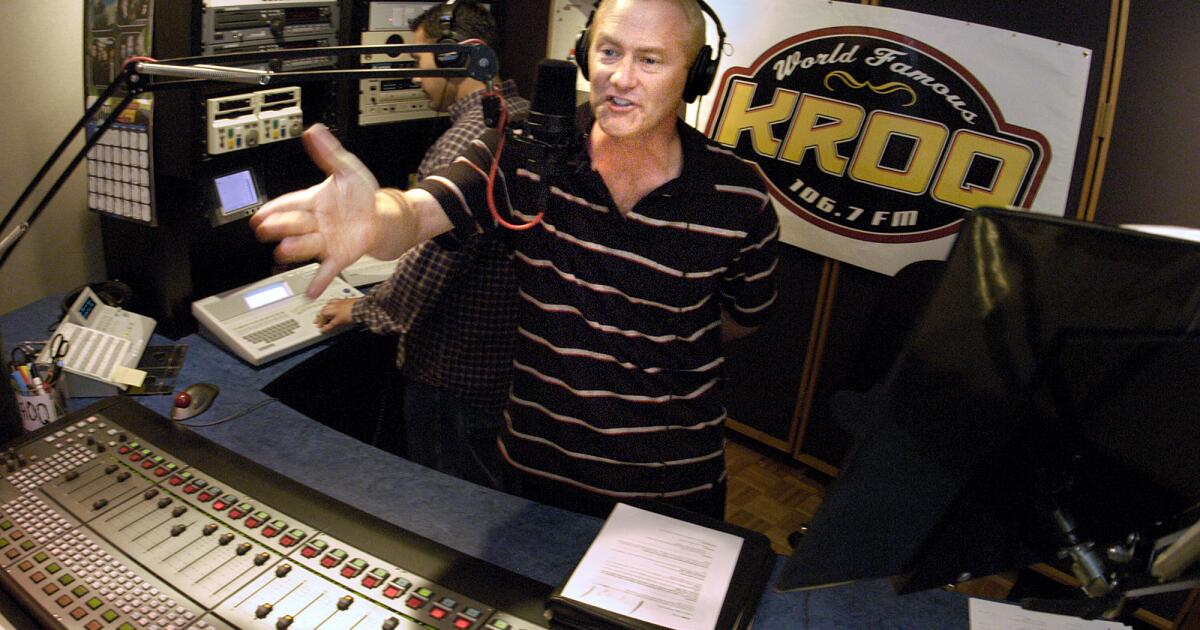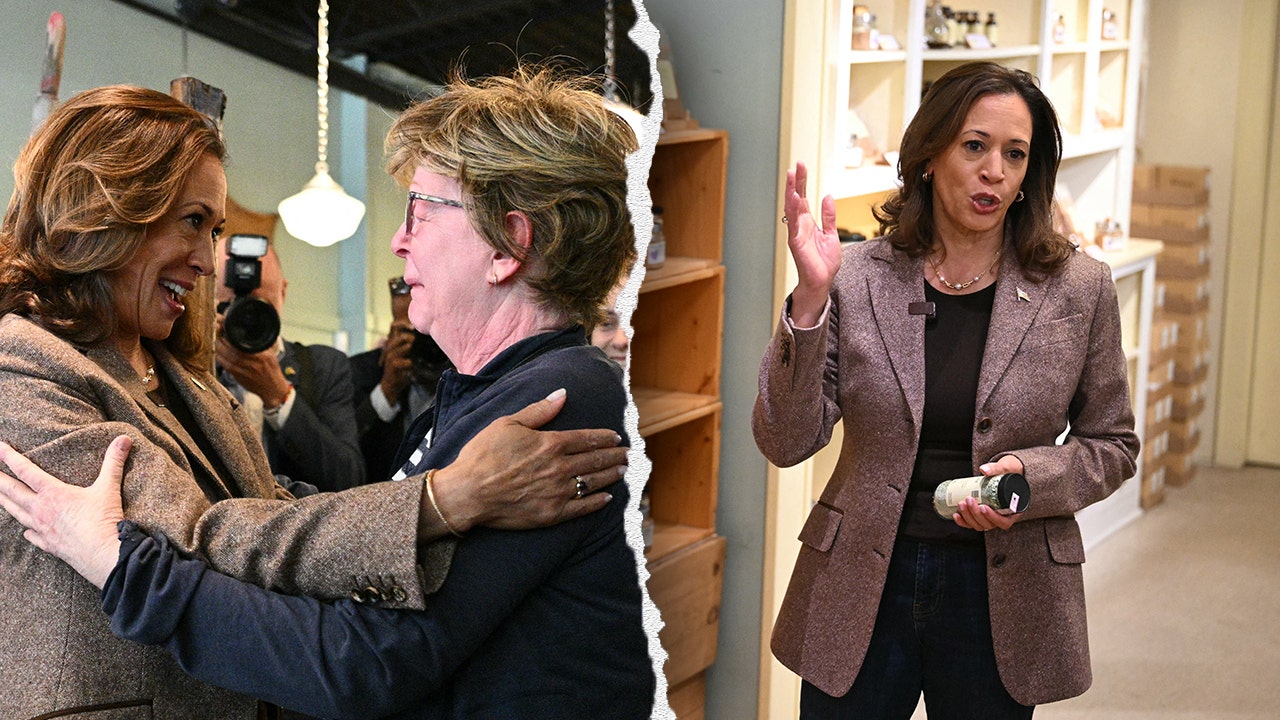Entertainment
Review: 'Seeking Mavis Beacon' tracks down a cyberghost who taught a generation how to type
Role models come in all shapes and sizes, invariably saying more about the nature of influencing than the person setting the example. A hearty thank-you, then, to pioneering computer-age figure Mavis Beacon for inspiring a documentary these many years later — Jazmin Jones’ effervescent adventure “Seeking Mavis Beacon” — that puts a tech icon’s impact into sharp, funny and thought-provoking context.
The kick is that Mavis Beacon isn’t a real person. But she resoundingly was one to the countless Black millennials who learned how to type from a software game launched in 1987 that featured the bright smiling face of an elegantly attired woman who looked like them and who seemed to be subconsciously selling empowerment.
Sliding into the gap between the creation of a late-’80s marketing invention programmed by three white men and our 21st century world of cyber-unreality, first-time feature director Jones becomes a cheery, determined DIY sleuth investigating a cultural icon. That involves tracking down the beautiful Haitian model named Renée L’Espérance who, after being hired from a perfume counter in Los Angeles, seemed to vanish after her visage launched millions of users into a new world of interactive education.
With the help of a savvy college-age collaborator and self-proclaimed “cyber doula” named Olivia Ross (also the film’s associate producer), the intrepid duo probes the Mavis mytho-history with a charming mix of reverence, intellectual curiosity and humor, like an internet-era Scooby-Doo gang of two. Leads are followed, “missing” signs are posted, spirits are conjured and cultural thinkers are interviewed on everything from the role of women in tech servitude — hello, Siri and Alexa — to such concepts as critical fabulism, data healing and cyberfeminism.
Director Jones, a lively onscreen presence, sees her project as following a path set by pioneering Black filmmaker Cheryl Dunye, whose landmark film “The Watermelon Woman,” we gather, is probably on a playback loop in her Mavis-centric office. Dunye’s noteworthy quote about researching the marginalized (“Sometimes you have to create your own history”) is Jones’ mantra for their archival mission. Early on, we see some playful deepfakes that show Mavis recognized by the likes of Obama and Oprah.
When the documentary shifts to cold-calling, door-knocking and crafty online digging, it turns out there are real, tantalizing details to unearth. The women secure interviews with two of the software company’s founders but wisely don’t accept their upbeat, carefully curated version as gospel, eventually learning that relations didn’t end so amicably between the men, who raked in millions, and the woman whom they paid $500 for her likeness.
As a counter, Jones has a warmer conclusion in mind for the film: a devotional sit-down with L’Espérance — what Jones calls a “wellness check” — if, that is, they can find her. Or if she even wants to be found. Watching Jones and Ross navigate a knotty search that straddles the pitfalls of citizen journalism, the energy of hero worship and the seriousness of ethical inquiry is where “Seeking Mavis Beacon” ultimately finds its truest heart, chronicling a journey that invariably butts up against the problem of whose perspective is taking center stage.
There are some cringeworthy moments watching the pair win at detective work while losing as vulnerable fangirls. But like any soulful quest worth its salt, “Seeking Mavis Beacon” makes the lows as meaningful as the highs, endorsing a wild web world in which mystery and exposure can peacefully coexist.
‘Seeking Mavis Beacon’
Not rated
Running time: 1 hour, 42 minutes
Playing: Landmark’s Nuart Theatre, West Los Angeles

Movie Reviews
‘On Swift Horses’ Review: Jacob Elordi and Daisy Edgar-Jones Light Up the Screen in a Ravishing Queer Epic

On Swift Horses begins by showing us two images: sex and a deck of cards.
Muriel (Daisy Edgar-Jones) is making love to Lee (Will Poulter), a soldier on leave from Korea. Meanwhile, Lee’s brother Julius (Jacob Elordi) has already been discharged from the war and is on his way to meet them both in Kansas, with only his bag and those cards. It’s almost Christmas and Lee wants Muriel to marry him, but she still hasn’t given her answer. Even so, the mood between them is light and fun. When Julius arrives, for a moment, they are one big happy family in Muriel’s cozy, secluded home, which she inherited from her mother. Spacious, lived-in and lovingly decorated for the holidays, it’s the exact kind of house one could imagine raising a family in. But Lee has dreams of California, and he wants Muriel and Julius out there with him when the war’s over. It’s a dream that sounds too good to be true, but he doesn’t know it yet.
On Swift Horses
The Bottom Line A sweeping heartbreaker that feels both classic and fresh.
Venue: Toronto International Film Festival (Special Presentations)
Cast: Daisy Edgar-Jones, Jacob Elordi, Will Poulter, Diego Calva, Sasha Calle, Don Swayze
Director: Daniel Minahan
Writer: Bryce Kass
1 hour 59 minutes
On Swift Horses is the kind of big, sweeping romantic drama that Hollywood just doesn’t make anymore. Director Daniel Minahan — a veteran of the small screen for many years, from Six Feet Under to Fellow Travelers — fills every widescreen shot with gorgeous landscapes and sumptuous colors, fully transporting us to a time when space was abundant and America felt full of possibility.
The film, based on the book of the same name by Shannon Pufahi, is an emotionally complex love triangle that branches out into something even more complex. Muriel marries Lee while pining for Julius — who seems to have much more complicated feelings for her, mixed in with a genuine love for his brother. Over time, both Muriel and Julius find other lovers, while writing each other all the while without Lee’s knowledge. Julius meets Henry (Diego Calva) while working at a casino in Las Vegas, and the two begin a passionate, caustic love affair. Down in the valley, Muriel skips work to fool around with her neighbor Sandra (Sasha Calle), a woman living openly as a lesbian despite the stigma. With Henry, Julius finds a man even wilder than him, full of endless ambition. But when it comes to Muriel and Sandra, it’s harder to tell if the feelings are real.
Both Julius and Muriel love to gamble, but while cards are his poison, she prefers betting on horses. Much like their shared vice, their queer love lives are just as dangerous. Even though Muriel comes home every night to her husband, he knows nothing of the life she leads while he’s away. Hiding her gambling money in their home, Muriel tries to maintain her double life without having to take the real risk of being alone. And though she sees Julius as a coward for not coming home to her and Lee, his life of risk is more honest, and over time he begins to confront his own demons.
Elordi gives his best performance yet as Julius, showing his more sensitive, vulnerable side on the big screen for perhaps the first time. His love scenes with Calva are tender and exciting, the men exploring each other’s bodies in a dreamlike motel room. Calva proves his memorable turn in the underrated Babylon two years ago was just a warm-up. He’s got so much more to offer.
In perhaps her meatiest role since Normal People, Edgar-Jones gives an understated performance as Muriel, letting us get to know her through subtle gestures and expressions. Muriel is a woman hiding from her own potential, trying to fit herself into a neat little box, all the while knowing that she can’t breathe once inside. Poulter’s Lee is not cruel enough for us to root against him, but there isn’t much for him to do beyond stand in as a symbol of everything Julius and Muriel want to run away from. A talented comedic actor, Poulter is convincing as the stereotypical ‘50s husband, reaching for his piece of the American dream. And then there’s Calle, who plays Sandra as a woman in the middle — not wanting to fly free or hide, but rather make the world accept her for who she is right out in the open.
On Swift Horses is about the shapes love can take, the varied lives we live and the many different ways one can make a home. It’s beautiful, heartbreaking and demands to be seen on the biggest screen possible. Here’s hoping it brings the romantic epic back into fashion.
Full credits
Venue: Toronto International Film Festival (Special Presentations)
Director: Daniel Minahan
Writer: Bryce Kass
Cast: Daisy Edgar-Jones, Jacob Elordi, Will Poulter, Diego Calva, Sasha Calle, Don Swayze
Producers: Peter Spears, Tim Headington, Theresa Steele Page, Mollye Asher, Michael D’Alto,
Executive Producers: Nate Kamiya, David Darby, Claude Amadeo, Randal Sandler, Chris Triana, Joe Plummer, Jenifer Westphal, Joe Plummer, Christine Vachon, Mason Plotts, Alvaro R. Valente, Bryce Kass, Lauren Shelton, Jeffrey Penman, Jacob Elordi, Daisy Edgar-Jones
Director of Photography: Luke Montpellier
Composer: Mark Orton
Production designer: Erin Magill
Editors: Robert Frazen, Kate Sanford, Jor Murphy
Art Directors: Kate Weddle, Elizabeth Newton
1 hour 59 minutes
Movie Reviews
‘We Live in Time’ Review: Florence Pugh and Andrew Garfield Deliver Achingly Resonant Performances in a Poignant Romantic Drama

Among today’s young acting talents, few possess the enviable combination of depth and charisma shared by Florence Pugh and Andrew Garfield, who play to those considerable strengths as a contemporary British couple who find themselves facing a medical crisis in John Crowley’s deeply introspective We Live in Time.
Handed its world premiere at the Toronto International Film Festival, where Crowley’s 2019 drama, The Goldfinch, was less enthusiastically received, the film eschews a traditional, linear approach to the subject matter in favor of a looser construction that weaves together a vivid patchwork of timeframes and memories to deeply poignant effect.
We Live in Time
The Bottom Line Beautifully performed, thoughtfully executed.
Venue: Toronto International Film Festival (Special Presentations)
Cast: Florence Pugh, Andrew Garfield
Director: John Crowley
Screenwriter: Nick Payne
Rated R,
1 hour 48 minutes
For thematic inspiration, Crowley takes his cue from the Lou Reed song “Magic and Loss (The Summation),” and especially the lyrics, “There’s a bit of magic in everything and then some loss to even things out,” in navigating the relationship between passionate, ambitious Almut (Pugh) and sensitive, attentive Tobias (Garfield).
Meeting each other in their 30s as fully-formed individuals with well-defined pasts and a clear sense of their wants and desires, Almut and Tobias proceed to set up house in South London’s verdant Herne Hill. She’s the chef in her own restaurant, and he, still raw from a divorce, is the corporate marketing face of Weetabix cereal.
Despite differing on wanting to raise a family — he’s raring to go, she’s unsure — they eventually end up having daughter Ella (Grace Delaney) after some difficulty getting pregnant, and would seem to be living an idyllic life when Almut receives a devastating diagnosis: a recurrence of ovarian cancer.
Rather than taking a conventional “where do we go from here?” approach, the unique script by playwright Nick Payne is more concerned with “how did we arrive at this place?” The film divides their story into three distinct time periods of varying lengths and re-splices them together in ways more interesting than standard chronological order. The approach allows for a series of lovely/surprising/amusing moments, from Tobias getting the back of his neck tenderly trimmed by his doting dad (Douglas Hodge) to Almut laying in a bathtub, balancing a biscuit on her very pregnant tummy to — in one of the film’s more audaciously choreographed sequences — giving birth in a petrol station loo.
It’s all immersively recorded by cinematographer Stuart Bentley’s photography, which penetratingly captures the defining moments in the couple’s decade-long relationship without ever feeling intrusive. Quite frankly, Bentley wouldn’t have been required to do much more than simply point and shoot, what with the generosity of those gorgeously honest performances given by Crowley’s two highly accomplished leads.
There’s an achingly palpable, playful chemistry between Pugh and Garfield that leaps off the screen. But they also refuse to shy away from letting their characters’ less attractive qualities bleed through. Beneath Tobias’ soulful eyes there’s an undercurrent of passive-aggressiveness that isn’t his best feature. Meanwhile, Almut’s silky-smoky voice can’t gloss over the painful frustration the disease is causing her when she insists on taking part in a prestigious international cooking competition despite her deteriorating condition and her husband’s concerns, protesting, “I don’t want my relationship with Ella to be defined by my decline.”
When that decline ultimately leads to the tragically inescapable and time reverts back to its chronological default, Crowley takes leave with the same tender yet truthful touch that informs the entire production. While We Live in Time and its subject matter might not lay claim to the audience uplift of Crowley’s Oscar-nominated Brooklyn, seldom has such an unflinchingly honest take on mortality felt so transcendently life-affirming.
Entertainment
Radio hosts Kevin Ryder and Doug 'Sluggo' Roberts fired from KLOS-FM

Los Angeles classic rock station KLOS-FM (95.5) has fired afternoon hosts Kevin Ryder and Doug “Sluggo” Roberts.
Ryder confirmed the duo’s ouster Friday on social media, making sardonic references to a marketing initiative the stations recently launched. “Ironic time to start a ‘Where’s Kevin???’ campaign,” Ryder posted on X, formerly known as Twitter.
In an Instagram video Ryder posted, several people, including one man looking under a desk, are shown asking, “Where is Kevin?” The video then cuts to Ryder, pulling a pint of ice cream and other goodies out of the freezer. “Well, I’m not there anymore,” the host says to the camera. “KLOS fired me.”
Direct messages to Ryder and Roberts were not returned, and a representative for KLOS or its parent company could not immediately be reached.
Ryder has been a fixture of the local radio airwaves for decades. He was previously with KROQ-FM (106.7), where he helmed the morning program “Kevin and Bean” for roughly three decades with his longtime on-air partner, Gene “Bean” Baxter.
After Baxter retired in 2019, “Kevin & Bean” was renamed “Kevin in the Morning With Allie & Jensen,” after his new co-hosts Allie Mac Kay and Jensen Karp.
But in March 2020, Ryder and his team were abruptly fired from the station.
Ryder made his comeback the following year with his hiring by KLOS, where he joined Roberts, who arrived at the station in 2019.
Burbank-based KLOS-FM has been on the air since the 1960s. It sold to investor and entrepreneur Alex Meruelo’s Meruelo Media in 2019, paying $43 million to the previous owner, Atlanta-based radio giant Cumulus Media.
Meruelo’s holding include several other local outlets, such as hip-hop stations KDAY-FM (93.5) and KPWR-FM (105.9) “Power 106.”
Terrestrial radio, while long a signature feature of L.A.’s heavy commutes, has come under serious financial pressure in recent years, thanks to competition from streaming music services and podcasting. Earlier this year, Meruelo Media made cuts to its Los Angeles stations, eliminating midday hosts.
Speaking to Variety, Ryder made reference to rumors that Meruelo is looking to unload its radio properties, including KLOS. “I hope they sell it to somebody who cares about it,” he told the trade publication.
-

 Politics1 week ago
Politics1 week agoTrump impersonates Elon Musk talking about rockets: ‘I’m doing a new stainless steel hub’
-

 World1 week ago
World1 week agoBrussels, my love? Is France becoming the sick man of Europe?
-

 Politics1 week ago
Politics1 week agoTrump campaign slams Harris as 'still a San Francisco radical' after CNN interview
-

 Politics1 week ago
Politics1 week agoHarris says no regrets about defending Biden fitness for office
-

 Science1 week ago
Science1 week agoThe new COVID vaccine is here. Why these are the best times to get immunized
-

 World1 week ago
World1 week agoLocals survey damage after flooding in eastern Romania
-

 World1 week ago
World1 week agoEU rejects 'democratic legitimacy' of Venezuela's Maduro
-

 World1 week ago
World1 week agoWhy is Belgium struggling to name a European Commissioner?














